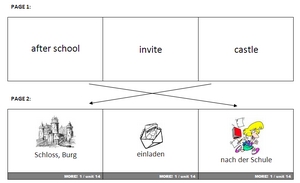|
ESL Forum:
Techniques and methods
in Language Teaching
Games, activities
and teaching ideas
Grammar and
Linguistics
Teaching material
Concerning
worksheets
Concerning
powerpoints
Concerning online
exercises
Make suggestions,
report errors
Ask for help
Message board
|
ESL forum >
Techniques and methods in Language Teaching > Words
Words
|
|

lisa.weix

|
Hi Asya,
YES, don�t I know that problem ... :) !!!
I find it very helpful to learn words with little cards - the English word on one side, a picture (if possible) or the German word on the other side. These cards are about 4 by 6 cm, so you can fit 18 of these cards onto an A4-sheet (just insert a table of 3 by 6 cells).

Page 1 is the English side, page 2 the other. These two are printed on one and the same sheet (careful: the column on the right on page 1 must correspond with the column on the LEFT on page 2! - see picture above). On one side I add the Unit these words are taken from (the grey line). Cut the cards, put them in a pile, and get learning ... first English side up to study the meaning of the words: if you know it, put the card aside, if you don�t, put it at the back of the pile - till all the cards are gone.
Next: Your language/pictures up - say the English words and check - correct ones aside, wrong ones back into the queue.
I do that myself when I try to memorize my Spanish words, and I personally think it�s a great way to study words. When I do my Spanish cards, I just write them by hand; the printed sheets I do for my students and send them by e-mail. They (hopefully) print them out on cardboard. Their results in tests have improved enourmously since I introduced that system. Studying the words is so much more fun handling those cards.
If you want, I can send you a sample that you can adapt, just send me a pm with your e-mail.
Have a great day,
best wishes,
Elisabeth.
|
5 Aug 2010
|
|
|
|
|

mish.cz

|
|
Hello, Asyuta,�
from my experience it is a bit more difficult to get older students to remember new words. with small kids you can use flashcards, crosswords, scrambled words, wordsearches, traced words, matching English and mother tongue equivalents or words and pictures and so on, they always seem to be very enthusiastic about these rather simple to prepare activities:-) With secondary school kids I always take care to teach them new words in the context. I push them to guess their meanings and explain the words either by synonyms or explanations. I really hate vocabulary lists. Among the activities the students seem to enjoy is again: having a word which one student is to explain purely in English for the rest of the class to guess. They really enjoy miming the words (of possible) or drawing the pictures on the blackboard. The last activity often turns into a lot of fun, especially when they are supposed to draw something abstract. I �d love to discover other similar ways of practising new words so please add any other ideas that are proved and working. hugs, Mish� � |
5 Aug 2010
|
|
|

lyny

|
Hi,
I have been teaching really fast courses (90 hous all levels) to very busy peolple so I teach firstly a lot vocabulary, then I teach structures and ss. begin to produce later
I work with flash cards (pictures and behind words), show first images and words and ask later.
Then I work with a lottery (same vocabulary) and at last with a domino with the picture one side and a word next side (hope you get it).
This way my ss. learn a lot vocabulary and their spelling is perfect, I teach almost 500 words in twelve hours (verbs, opposites, nouns...) then my ss. begin to structure language.
Later I work with basic readingswhere they learn some new words by context.
They have to highlight new words to review easily new vocabulary this way they reinforce vocabulary and structures.
Belive me it is a ssuccess, I have been working this way for many years
The most important:
Introduce vocabulary with flascards, play a lottery and then a domino.
I hope it works for you too
Have a good day

|
5 Aug 2010
|
|
< Previous
1
2
|